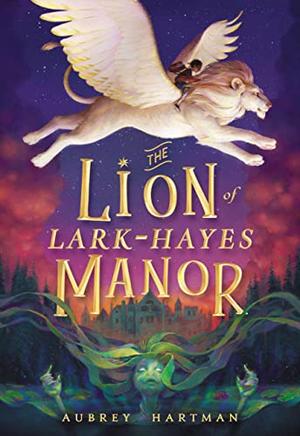Readers of Rick Riordan, C.S. Lewis, or other writers of fantasy will likely find The Lion of Lark–Hayes Manor a delight! Under the influence of Aubrey Hartman’s pen, readers will join the journey of sixth grader Penelope Woodlock (Poppy) who makes a hasty and soon regrettable bargain with a water nymph who has been banished from the Old World.
Possessing a vivid imagination, Poppy, a creative and passionate book-lover, moves from Virginia to Oregon with her historic preservationist parents and her brother Luc. As Poppy struggles to adapt to the new environment and to the social dynamics of middle school, she finds solace in books and often dresses like characters from her favorite fantasy novels.
On one of her adventures while exploring the site of her parents’ newest project to restore the Lark-Hayes Manor, Poppy encounters a terrifying creature “shaped vaguely like a woman, with angular joints and skin the color of sun-dappled water” (33) trapped by a piece of construction equipment. In return for saving the naiad’s life, this creature with barracuda teeth and clusters of iridescent scales coiled around her neck and arms grants Poppy a wish. Poppy initially wishes to visit Narnia, the fictional world of magic from one of her favorite books, but the nymph is unable to magic an entire make-believe kingdom into existence, so Poppy instead wishes for a winged lion.
However, this bargain involves a price. According to the nymph, bringing something into this world requires that something of equal worth be taken from it in order to maintain balance in the universe. Without realizing the repercussions, Poppy hands over her copy of the first Narnia book, describing books as “kind of like the magic of our world” (40).
As the magic takes effect, all manner of adventure unspools while Poppy confronts the consequences of her decision. In addition to the adventure, readers are apt to appreciate Hartman’s definition of a hero, as well as her various descriptions of books and their power. Along with Poppy, we realize that heroes also make a lot of mistakes. When a book has a realistic ending, rather than one wrapped in a perfect bow, it gives us a sort of permission to see ourselves as a hero despite our flaws, “sometimes even because of them” (125).
Furthermore, books give us permission to be someone else for a short time, “and it feels good to be big when everything else is trying to keep [us] small” (231). While the world around us has rules and limitations and boundaries, a book never imposes these rules or tells us what we can’t do or be; “books only tell us what we can do” (231). They plant a seed in our soul, helping to shape and inspire us.
- Posted by Donna

